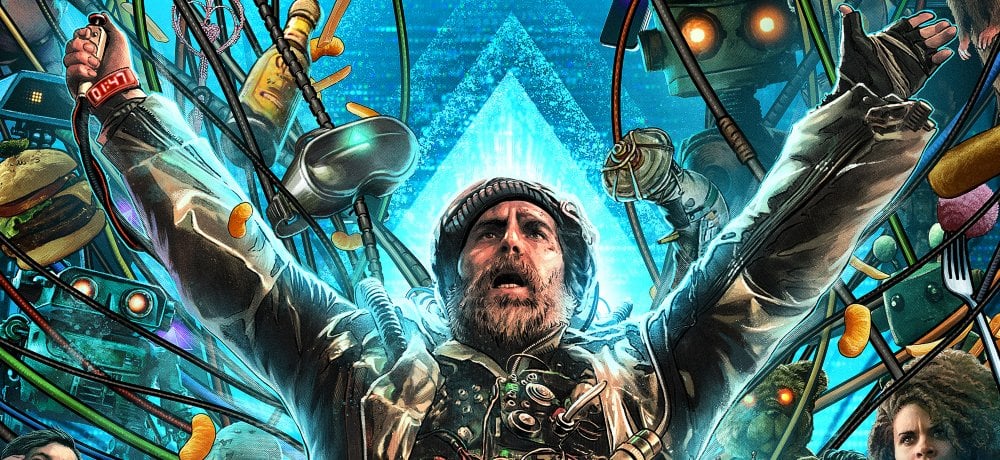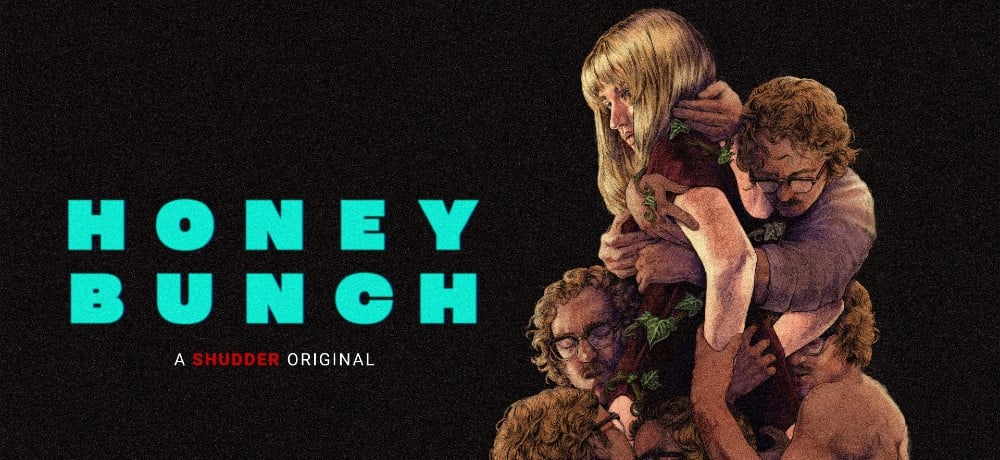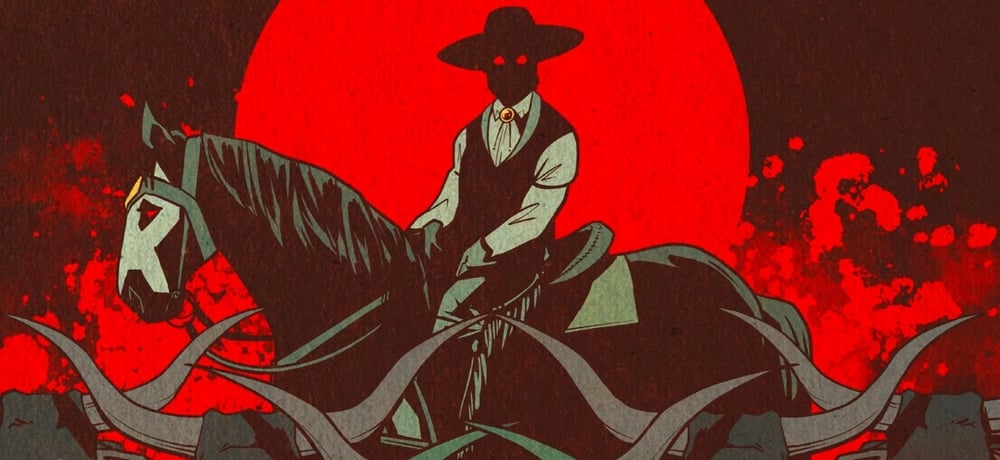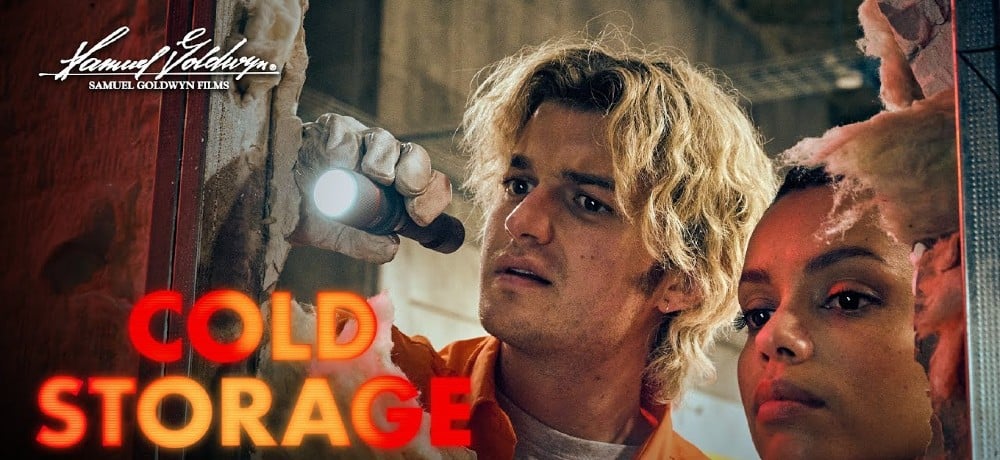





Just a few days ago, Beyond the Black Rainbow filmmaker Panos Cosmatos’ second feature Mandy celebrated its world premiere at the 2018 Sundance Film Festival. Daily Dead had the opportunity to speak with Cosmatos, as well as the film’s star Nicolas Cage (who was only able to join us briefly) and co-star Linus Roache, who portrays the villainous cult leader Jeremiah, and they discussed the evolution of Mandy, their experiences collaborating together and with Andrea Riseborough, who plays the titular character, and much more.
Panos, can you speak about why you wanted to make the film, and for the actors, can you two discuss why you wanted to be a part of this project in particular?
Nicolas Cage: I wanted to work with Panos. I'd seen Beyond the Black Rainbow. I thought it was powerfully unique, a world unto itself, visionary and artistic and hallucinogenic. I felt that, to be able to play a man with the pathos of Red Miller in that kind of world would give me something that I've never done before.
Linus Roache: Yeah, I saw Black Rainbow. After I read the script and saw the character that Panos had created, it was an opportunity to kind of just explore the outer limits of the male ego, in all its grandiosity and pomposity and outrageous violence. It was a gift of a role to be given. And, then, to get to work with Nic was a bit of a bucket list dream come true. So, it couldn't have been a better opportunity for me.
Panos Cosmatos: I started writing Mandy at the same time that I was writing Black Rainbow, which was after the death of my father, which was compounded on top of the death of my mother, which I had sublimated and completely suppressed and not dealt with. I realized that I had to sort of face these things and cope with them or it was going to eat me alive.
And so I started writing Black Rainbow and Mandy at the same time. And it wasn't on purpose, but I realize, in retrospect, that they were both articulating two separate parts of the same thing, which was that Black Rainbow deals a lot with control, and it's sort of like an expression of how I was pushing it in my emotions and felt kind of trapped. Mandy is the opposite of that, which is about releasing all these emotions that still come out of that. It's a very emotional, outward expression of those feelings. I've said that Black Rainbow is like an inhale, and Mandy is like an exhale. Because of my feelings that I was working through, I became very obsessed with revenge on or around that time, because it can be a very cathartic genre, but I wanted to make a revenge movie that centered around the person in a way that was being avenged as much as the avenger.
What was the collaborative process for you guys on this film, since so much of Mandy feels very experimental and almost fluid?
Linus Roache: I can speak to that, because Panos had created this world and then you imagine that you could work with a director who then says, "You have to do it my way and it’s my world." He's so generous with what he's created, and just invites you in to bring your best game, your ideas, and if they don't work, then we talked them through. He was so open, which is incredible when someone's developed something and worked so hard to create it. People get very pressured, so "collaboration" is the word. Filmmaking is a collaborative process. You can't do it alone, and you rely on all these talents coming together, and if you don't have a good leader, the talents just don't come together.
Panos Cosmatos: To me, actors are the most magical creatures in the process of making a film, because you spend so much time alone and you're inside your head creating these characters and imagining them and trying to give them life. And then, when the actors enter into the process, they always invariably have their own sort of ideas and approach, too, which are always super amazing and enrich it so much more. So, it's always a pure joy to watch something that you built in your mind brought to life, where it feels almost like a model kit blooming into a fully breathing person.
How was it working with Andrea on Mandy? I thought she was just incredible.
Panos Cosmatos: I think Andrea is one of the greatest actors of her generation. She's an amazing chameleon, and I'm constantly having people come up to me who are seeing her in other things recently and being like, "I didn't even realize that it was Andrea until three quarters of the way through the movie, and then suddenly it dawned on me." They're just so blown away by how deep she goes here.
Linus Roache: I just had this one very intense scene with her and it was wonderful to do, but last night seeing the movie, it kind of blew my mind that she represents all the different facets of the feminine. She's the mother, the sister, the daughter, and the lover. It really was incredible.
Panos Cosmatos: There are certain things in this film that are rooted way back in my past. Red Miller was inspired by when I was a very young kid. We lived in Guadalajara, Mexico, and one of our neighbors in this bungalow complex was a drug cop, a narc. And he had blonde, swooped-back hair, and he'd wear aviator glasses and practice firing his .44 Magnum at the outer wall of the complex and nobody could do anything because he was a cop. He'd run around on his Harley and one day I was out there and I was playing on the grass, there was a lightning storm and he came burning around the corner on his Hog, with his lady clinging to his back. He saw me, he came up and did a 180 right in front of me with the lightning above him. And in my mind, that was the genesis of Red Miller, right there.
And when I was a kid, there was this shitty fair in our town called the JC Fair. I was around eight years old or ten years old, and there was this stall that was selling ZZ Top wallets. I was like "Oh, they have a ZZ Top wallet, I need this." So, I went to buy the ZZ Top wallet and this woman that was working, selling the wallets, she was obviously a metal head, and as a young boy, I just fell in love with her. And when I walked away, she called out, "Hey!" and my heart leaped, because I thought, "Oh, she's calling back to me." So, I turned around she was like, "You forgot your fu**ing ZZ Top wallet, kid," [laughs]. I feel like I had an idea of Mandy in my head, but I don't think that Mandy fully came to life until Andrea inhabited her.
You mentioned last night that Spectrevision was really into making this film, and how important it was to you to make this film how you wanted to make it. With this story, you could've done this a completely different way, you could've told this story in a completely different format that was more straightforward. So, why was it so important for you to do it in this way?
Panos Cosmatos: Oh, for sure. There are a lot of genre elements in this film that could have been done in a much more straightforward way, but that's not the kind of movie I'm interested in making. There's an old quote that always stuck in my head which is, "It's not what a movie is about, it's how it's about it." That's always really stuck in my head, almost like a mantra to me. So, making a film like this, the approach to it, and the tone of it is everything. I knew that if I brought this script to certain people, that there would be a lot of pressure to make something I had no interest in making, where it could have been a much more generic kind of cut and dry film. That's not the kind of thing I'm interested in making. Spectrevision, they know that and they backed me all the way. They were very patient with me and just really great. As the saying goes, "Slow and steady wins the race."
---------
In case you missed it, check here to catch up on our other live coverage of the 2018 Sundance Film Festival, including Heather's five-star review of Mandy.